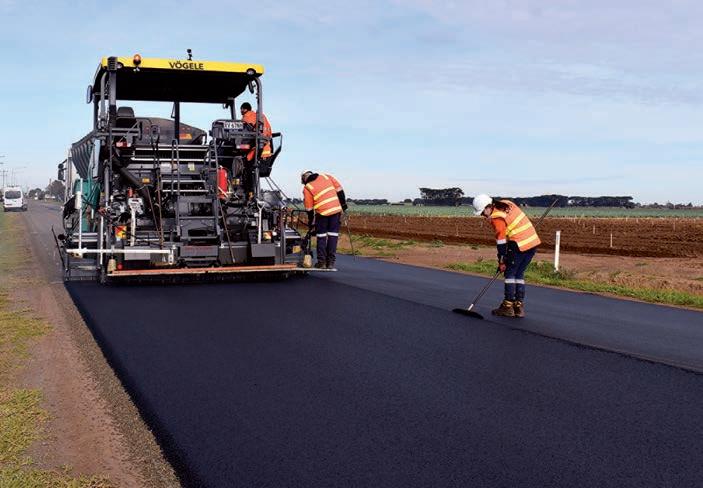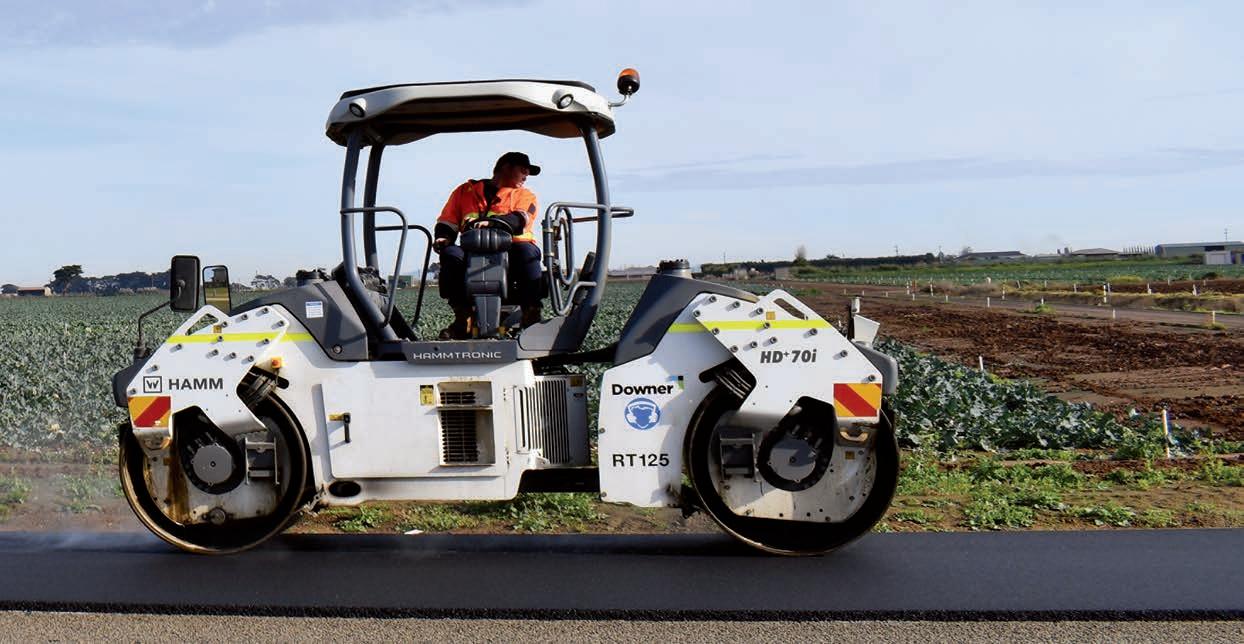
5 minute read
Going green
DUNCANS ROAD
GOES GREEN
WHEN GIVEN THE TASK OF MANAGING THE WESTERN ROADS UPGRADE NETWORK FOR THE NEXT 20 YEARS, BROADSPECTRUM (NOW VENTIA) LOOKED AT THE POSSIBILITY OF USING INNOVATIVE RECYCLED PRODUCTS TO DEMONSTRATE THEIR PERFORMANCE, CHOOSING DUNCANS ROAD AS A SITE FOR DOWNER’S RECONOPHALT WEARING COURSE TO BE LAID.
In 2017 the Netflow consortium won the Victorian Government’s $1.8 billion contract for the Western Roads Upgrade.
The terms of the public-private partnership contract included design, build, finance and maintenance aspects which will see the consortium look after the road network for 23 years in total.
The consortium comprises Plenary Group and Cintra as joint project sponsors; WBHO Infrastructure as design and construction lead; and the Amey and Broadspectrum joint venture as services contractor. (Broadspectrum was acquired by Ventia in June 2020).
The Western Roads Upgrade program comprises eight priority roads upgrades, road widening works, intersection upgrades, almost 30 kilometres of road duplication works and 260 kilometres of road rehabilitation and maintenance across Melbourne’s west for 23 years.
As the service contractor to the Netflow consortium, Broadspectrum will handle the maintenance of the road network for the next two decades.
Drew Morrison, Project Director at Broadspectrum says the 20-year maintenance period means the company is always looking to improve sustainability outcomes over the life of the program.
Through the company’s relationship with Downer comes the opportunity to resurface roads with their product Reconophalt which contains soft plastics, glass and toner.
“We will continue to resurface roads for the next 20 years across Melbourne’s

western arterial road network. This gives us the opportunity to trial products that have not previously been used on the network, as they incorporate materials reclaimed or developed from alternate sources and innovative products,” Mr. Morrison says.
“We get the opportunity to prove that these products perform in a controlled environment, and as services provider we are able to monitor performance and then hopefully make recommendations to continue their use more widely on the arterial road network.”
To make the most of this opportunity to trial a sustainable wearing course layer, Broadspectrum decided to lay 784 tonnes of Reconophalt over 960 metres on Duncans Road in Werribee South.
The Reconophalt mix was placed next to a standard wearing course asphalt for Broadspectrum to easily compare its performance.
Duncans Road was a full pavement rehabilitation project and incorporated an insitu-stabilisation of the subgrade and base layers. Instead of disposing of the old road base, it was treated onsite so that it could be reused.
Following stabilisation, Reconophalt was placed as the wearing course layer meaning that over 70 per cent of the upgraded section on Duncans Road was rehabilitated with recycled materials.
“Working with Downer, we can identify opportunities to recycle and reuse materials generated from waste streams from our, and other industries,” Mr. Morrison says.
“We are in the process of getting our services contract certified by the

Infrastructure Sustainability Council of Australia (ISCA) and rated, so the ability for us to use alternate products that provide sustainability outcomes for everyone is a very important part of planning our works.”
Downer has long been working to create sustainable products for the road construction industry and first released Reconophalt in 2018.
Jim Appleby, General Manager Reconomy at Downer, says Reconophalt is an asphalt mix which can use a range of recycled materials including reclaimed asphalt pavement (RAP), glass, soft plastics and toner. He says the idea is first to protect the environment, but also to produce a durable asphalt.
“For the Duncans Road project, the RAP was sourced from the existing Melbourne road network,” he says.
“Then the soft plastics and toner were sourced by our partners at Close the Loop who produce the materials using domestic supplied soft plastics from the recycling scheme at Coles and Woolworths.”
While Reconophalt is different to a traditional asphalt mix, there is no change in equipment or process when laying the mix.
“One of the best aspects of Reconophalt is that you use it exactly as you would with normal asphalt. When you lay it looks the same, but it can perform better,” Mr. Appleby says.
He recently travelled to Craigieburn to view the first application of Reconophalt, two years after its application, and he says it still looked exactly as any other asphalt would.
“Before any product is brought to market at Downer there is extensive testing, we
Using Reconophalt, there is no change in equipment or process.
conduct accelerated failure testing and we look at all the parameters around the material performance. We have confidence in its longevity. We understand how it is going to perform for its lifetime long before that lifetime comes around.”
Broadspectrum will monitor the performance of the Reconophalt pavement over the next few years and are keen to increase use of the product if it performs as expected.
“Putting Reconophalt on the top layer we have seen some amazing roughness results already which we know helps maintain a road’s condition. We are expecting that road to perform remarkably well over the initial 10 years and then it will undergo lifecycle treatment further down the track,” Mr. Morrison says.
“My hope is that recycled products like Reconophalt become normal. We know quarry stocks in the state are under pressure. For us, we have 20 years ahead to maintain these roads and we want to open up as many options for treatment as possible,” he says.
The recycled products in Reconophalt are not there simply to help alleviate a waste stream, Mr. Appleby says the soft plastic is a polymer which helps to improve the fatigue life of the asphalt.
“At Downer we pull products we don’t push waste. The public are demanding increased recycling which means government need to do it and we are seeing some great signs of this with the Recycled First Initiative in Victoria and the Too Good To Waste initiative in New South Wales,” Mr. Appleby says.
The Victorian Government’s new Recycled First policy requires companies delivering transport projects to demonstrate how they will optimise their use of recycled and
reuse content.
This will see recycled aggregates, glass, plastic, timber, steel, ballast, crushed brick, crumb rubber, and reclaimed asphalt pavement take precedence over virgin materials.
Mr. Morrison agrees on the importance of using waste products which add value to road construction.
“I hope that any time there is an alternate product or an innovation we are able to grasp those opportunities as they arise and who knows what that could look like in the next 20 years,” he says.
“Now there are great things being used like recycled plastic bags, toner and glass bottles but there are endless possibilities when it comes to what the next source of material is going to be for road materials.”










